For some time, the government has been considering how best to manage the billions of estimated rent arrears in order to avoid a flurry of winding-up petitions and evictions. This requires a careful balance to protect both landlords and businesses in need, which proposed legislation to ringfence certain rent debt seeks to do. In their latest policy statement, the government has outlined the new process they are looking to legislate.
Current Position
-
Eviction – Landlords of commercial properties are currently prevented from evicting tenants for non-payment of rent. With the measure originally put in place until 30 June 2020, this has been extended multiple times, most recently to 25 March 2022. The latest policy statement, says that this prohibition will only continue until the new legislation is enacted.
-
Commercial Rent Arrears Recovery – Similar to the above, the restriction on the use of the Commercial Rent Arrears Recovery process has prevented landlords seizing tenant goods in lieu of rent owed unless the tenant has more than 554 days’ worth of arrears. This restriction has again been extended until 25 March 2022, unless legislation is passed ahead of this.
-
Winding Up Petition – Finally, restrictions on winding up petitions have also been extended until 30 September 2021.
The government believes the retention of these measures should help support ongoing negotiations between tenants and landlords, giving them the breathing space needed whilst further legislation is put in place.
The New Legislation
-
Ringfencing – The government’s new legislative process will seek to ringfence rent debt accrued from March 2020 for commercial tenants who have been affected by COVID-19 business closures, until restrictions for their sector are removed. Once the legislation is implemented and current forfeiture restrictions lifted, landlords will be able to evict tenants, for non-payment of rent prior to March 2020 (or for rent due following the end of the ringfenced period) and evict those tenants with outstanding arrears who were not affected by business closures during this period. It is also clear that the government expects commercial tenants to pay rent as per their lease, or as otherwise agreed with their landlord, from the point of restrictions being lifted for their sector.
-
Last Resort – The policy statement makes clear that the legislative process to be put in place should only be used as a matter of last resort. Before reaching that point, the government expects landlords and tenants to have tried to negotiate, and notably the government expects landlords to defer or waive appropriate proportions of rent arrears, with landlords expected to share the financial burden with tenants where they are able to do so. Such negotiations should be based on principles which the government intends to outline in an updated Code of Practice.
-
Binding Arbitration – Full details of the process to be put in place are yet to be released, but it is clear that if a party is found not to have negotiated in good faith prior to entering such a process, costs may be granted against them.
-
Return to Normal Arrangements – As noted above, the government has made it clear in the new policy statement that tenants who can pay should pay where they are not affected by closures, and for any debts accrued outside of the ringfenced period. They expect ‘Businesses that are open and trading as normal to pay their full rent unless otherwise agreed, as periods of normal operation will not be covered by further legislation.’ Tenants will be expected to make clear to their landlord how payments they do make are to be treated, and the period of time the payment should be apportioned to. Landlords will also be able to charge interest on rent accrued from the end of the ringfenced period in accordance with their lease.
-
Other Contractual Breaches – Where a tenant breaches other terms of their contractual agreement, the policy statement notes landlords will still be able to move to evict them if such breaches give rise to a right to forfeit.
In light of this, it appears that the government is seeking to pull tenants back from the edge, whilst balancing the needs of landlords. It is worth noting, however, that the policy statement explains further measures on the use of insolvency measures to recover rent arrears will be announced in due course. We thus await the announcement of such new measures, alongside the expected draft legislation, to see how this is put into effect.



 />i
/>i
